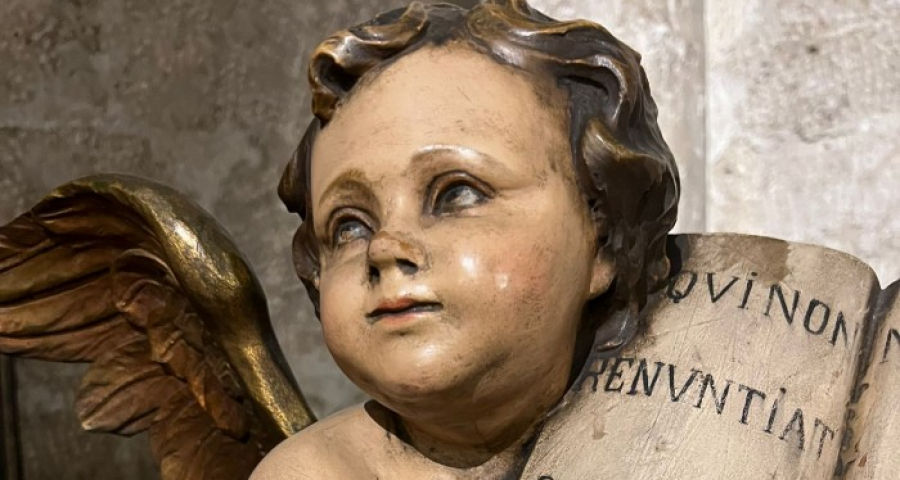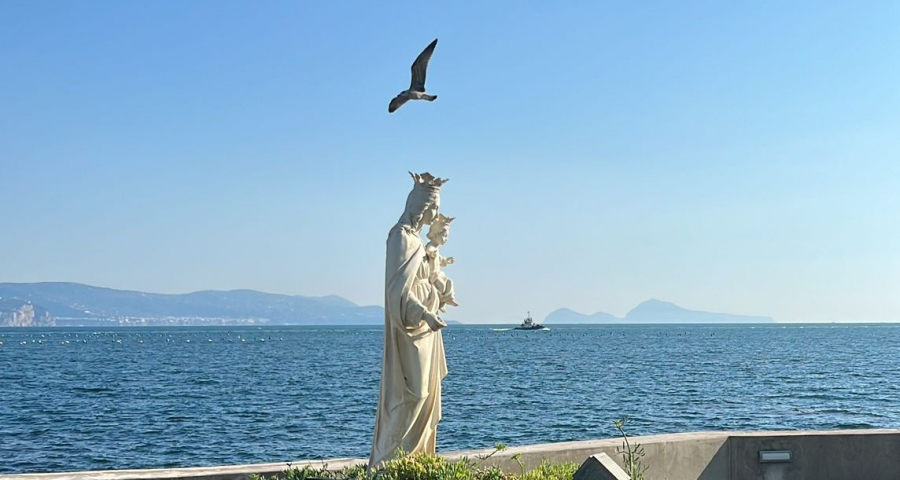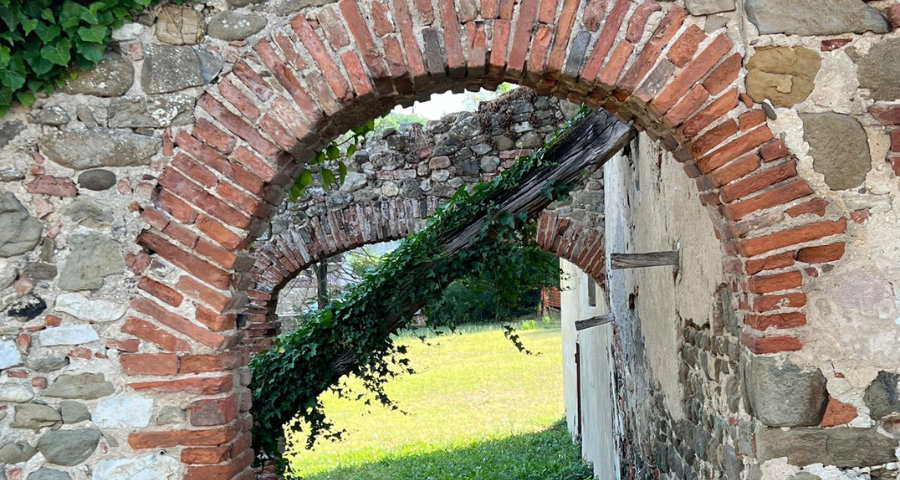The mystery revealed/12 - The "open book" of the Eternal one tells us that the monsters do not have the last word
By Luigino Bruni
Published in Avvenire le 19/06/2022
"Know what is above you: an eye that sees, an ear that listens and all your actions written in the book."
Rabbi Yehudah ha Nasi, Pirqe ’Abot
The four monstrous beasts in Daniel's dream make us enter into the mystery of the iniquity of the world and of those who dominate it, but they also give us a more concrete hope.
Dreams are one of the languages spoken by God. Daniel and Joseph are the first two names that come to mind when the word dreams are mentioned in the Bible. Two similar and yet different men. Both dreamers, both interpreters of the dreams of others. Joseph begins his friendship with dreams by dreaming, his big dreams make him the envy of his brothers. Sold as a slave, he arrives in Egypt and there, in a prison, he begins to interpret the dreams of others. Daniel on the other hand, while in exile, begins by explaining the terrible and difficult dreams of the Babylonian king Nebuchadnezzar, and after having interpreted the dreams of others, he too begins to dream. In prophetic vocations, sometimes you begins by dreaming and end up helping others to dream. Other times, life immediately leads us to dealing with the dreams of others, trying to understand their visions and their nightmares and after having spent our best years and almost all our strength to free others from their bad dreams and to explain the most beautiful ones, one night, exhausted, we fall asleep, and in what seemed like a night like any other, we finally begin to dream as well.
We have arrived halfway on our journey with Daniel. Chapter 7 is the centre of his book. It is one of the best known texts in the entire Bible and among the most complex for exegetes and historians, one of the passages that most influenced the New Testament, the faith and the medieval apocalyptic (Joachim, Hildegard). It is the chapter of the Four Beasts and the Son of Man. In chapter 6 we were in Babylon under the Persian rule of King Darius. Now let us go back in time a few years: « In the first year of Belshazzar king of Babylon, Daniel had a dream, and visions passed through his mind as he was lying in bed. He wrote down the substance of his dream» (The Book of Daniel 7,1).
Daniele begins to dream. Here is his dream-vision: «In my vision at night I looked, and there before me were the four winds of heaven churning up the great sea. Four great beasts, each different from the others, came up out of the sea» (Daniel 7,2-3). Here, we find ourselves in a mythological environment, perhaps influenced by the Enuma Elish, a Babylonian tale about the creation of the world and the exploits of the god Marduk: «The first was like a lion, and it had the wings of an eagle. I watched until its wings were torn off and it was lifted from the ground so that it stood on two feet like a human being, and the mind of a human was given to it. And there before me was a second beast, which looked like a bear. It was raised up on one of its sides, and it had three ribs in its mouth between its teeth. It was told, ‘Get up and eat your fill of flesh!’ After that, I looked, and there before me was another beast, one that looked like a leopard. And on its back it had four wings like those of a bird. This beast had four heads, and it was given authority to rule. After that, in my vision at night I looked, and there before me was a fourth beast - terrifying and frightening and very powerful. It had large iron teeth; it crushed and devoured its victims and trampled underfoot whatever was left. It was different from all the former beasts, and it had ten horns» (Daniel 7,4-7). These beasts have fed generations of artists, and with their ugliness they have made the world more beautiful - art also has this cathartic ability to transform monsters into masterpieces.
For ancient man it was normal to use large animals as images of the terrible and monstrous, partly due to how vulnerable men, women and children were to wild animals. Today we would no longer use lions, bears, eagles or leopards as icons of absolute evil, because time and civilization has allowed to get to know animals, revealing their mystery, their dignity and their beauty to us. This is a case in which the civil and ethical growth of civilization makes us feel a certain discomfort when confronted with some biblical pages today. A discomfort created by the Bible itself, which has fertilized the centuries and thus generated women and men who in reading it activate feelings and emotions the Bible did not have when it was written. When this happens, the Bible thanks its readers for making it better - sometimes when we feel a tension when reading the Bible it is we who must grow in spirituality, other times it is the Bible that asks us to make it grow in humanity.
In the description of these four beasts we find traces of biblical (Psalms, Job, Hosea) and extra-biblical (Canaanite, Iranian, Persian, Ugaritic) influences, mixed and enriched by the imagination and narrative genius of Daniel (and genius it is, as we are finding out). The fourth beast has features in common with Leviathan, the ancient Canaanite monster Lotan that we find in several biblical books and later in Thomas Hobbes. There is a parallel between the beasts dreamed of by Daniel and the statue of different metals that Nebuchadnezzar dreamed of (chapter 2). They are, in fact, both a prophecy on the succession of kingdoms, from the Babylonians (lion) to the Greeks (the fourth beast), passing through the Medes (bear) and the Persians (leopard). The final redaction of this chapter dates back to the terrible persecution of Antiochus IV Epiphanes (175-163 BC): he is the fourth and the most monstrous beast. Daniel therefore reads the succession of empires as a succession of beasts, of increasingly terrible and devouring monsters. A passing of judgment without a chance for appeal, a radical historical condemnation where the words of dialogue and occasional good words about the kings we met in the previous chapters have all but disappeared.
In general, the Bible does not have a positive view of power and rulers because it knows that power tends to corrupt rulers and is rarely used for the good of the people. The prophets, however, reach very harsh and sometimes radical tones, because they are certain that this harshness is their only way of serving the common good. How many monsters have we seen over the centuries with the ribs of men and children in their jaws, how many beasts with iron teeth that crush everything, and how many are we still seeing today? Iron teeth of armies, iron teeth of the industries of death, monsters that "trample underfoot" everything they encounter, including our planet and the environment. Perhaps few other sections in the Bible have been capable of this power of prophecy: that ancient writer the Babylonian, Persian and Greek superpowers with their armies of horses and elephants before his eyes. He could not have imagined that those four-headed monsters, ten-horned, iron-toothed beasts of his would be a much better description of our tanks, fighters, precision missiles, which "trample and devour everything". What, perhaps, that distant author also could not have imagined, is that after two thousand and two hundred years the beasts still continue to destroy everything and that we in addition have multiplied their destructive force to excess. Biblical prophecy is also the spectacle of immense failure - failure does not scare the prophets, it is where they are at their best.
At this point the tone and the scenery of the vision change: «As I looked, thrones were set in place, and the Ancient of Days took his seat. His clothing was as white as snow; the hair of his head was white like wool. His throne was flaming with fire, and its wheels were all ablaze. A river of fire was flowing, coming out from before him. Thousands upon thousands attended him; ten thousand times ten thousand stood before him» (Daniel 7,9-10). Another amazing and mysterious character: "the Ancient of days" or "the Eternal one". It is a clear image of God, surrounded by his immense heavenly court. He sits on a throne like a chariot of fire - how can we not think of Ezekiel and Elijah? - a sort of celestial Ark of the mobile covenant. This Ancient-of-Days is a judge. His court is also the court of a supreme court: «The court was seated, and the books were opened» (Daniel 7,10).
The books are opened. What books? As in our human courts, where the judges read the minutes of the case, in heaven, at the end of time, the Supreme Judge will read the books where all good and bad deeds are recorded. Here the book of the ancient one looks like a sort of ledger, where sin-debts are noted, in particular of kings and empires. Here is the verdict: «Then I continued to watch because of the boastful words the horn was speaking. I kept looking until the beast was slain and its body destroyed and thrown into the blazing fire. (The other beasts had been stripped of their authority, but were allowed to live for a period of time)» (Daniel 7,11-12). We can read this doom as a page of retributive religion, showing us an accountant God who notes our every sin in his accounting records. The Bible, the Old and New Testament, contain this as well. However, there is more in this "open book": the hope that the "beasts" of history, the inhuman monsters that devour everyone and everything, will not have the last word. It is the prayer that even tremendous power is only penultimate in line.
Daniel is telling us that God is not disinterested in our history; he has not separated himself from the so as not to have to deal with it anymore. He is alert, observes, notes and then judges everything. His is not a judgment outside of history; it is not something that will happen in the next life or in heaven (a category absent in the Hebrew Bible). Nor is it the final judgment that will happen at the very end of the story. No, the judgment of the Ancient-of-Days was taking place even while the sacred writer was writing his book. Having postponed the final judgment in Christianity to the end of time or to after death, may lead us to think that the judgment of the Ancient-of-days will not be taking place now while we are writing our book here on earth. Instead, the books are being opened here and now, while empires continue to trample, shred and devour. The verdict is being pronounced: let us listen to it. While the Ancient One is speaking it, our heart must pronounce it. The existence of a higher and different judgment is a profound need in the soul of individuals and people everywhere, it is the cry of the victims, it is the fundamental right of the poor, and hence it is written and shouted out aloud by the prophets. That different book must exist somewhere. It is not true that the hope that there is a judgment of the last resort reduces our efforts to improve our "books" here on earth. Instead, it increases them, because it tells us that we are not alone in fighting the monsters with large iron teeth: a higher Hand is working with us.








_large.png)




